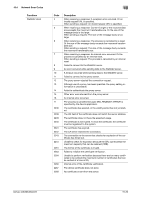Konica Minolta bizhub 223 bizhub 423/363/283/223 Network Administrator User Gu - Page 359
The abbreviation for Internetwork Packet Exchange/Sequenced Packet Ex - movie data
 |
View all Konica Minolta bizhub 223 manuals
Add to My Manuals
Save this manual to your list of manuals |
Page 359 highlights
15.5 Glossary 15 Term Gray scale Group GSS-SPNEGO/ Simple/Digest MD5 Halftone Hard disk Host name HTTP IEEE802.1X Install Internet Fax IP Address IP Address Fax IPP IPsec IPv6 IPX IPX/SPX JPEG Kerberos Description A form presenting monochrome image by using the gradation information shifting from black to white. The grouping of multiple abbreviation numbers. It will be convenient to use the group when a volume of serial broadcasts or serial pollings are distributed to the same destination addresses. Authentication methods used for logging in to the LDAP server. The different authentication method, GSS-SPENEGO, SIMPLE or Digest MD5 is used for a LDAP server depending on the type of the server being used or server settings. A method for presenting the shading of an image by using different sizes of black and white dots A large capacity storage device for storing data. The data is retained even after the power is turned off. The name of a device on the network. The acronym for HyperText Transfer Protocol. This is a protocol used to send or receive data between a Web server and a client (such as a Web browser). HTTP can exchange files such as images, sounds, and movies that are associated with documents, including their presentation formats and other information. A standard used in a wired or wireless LAN to authenticate terminals gaining access to the network. A LAN switch compatible with IEEE802.1X permits a user to connect with the LAN after authentication (to confirm whether the user is authorized). To install hardware, operating systems, applications, printer drivers, or other software on to a computer. A transmission method by which the scanned original data is transmitted among Internet fax machines and computers as TIFF format E-mail attachments via the intranet (in-house network) and the Internet. An address or a code used to identify an individual network device on the Internet. IPv4 (Internet Protocol version 4), a protocol widely used today, adopts a 32bit number for an IP address separated into four sections. An example of an IPv4 IP address is: 192.168.1.10. On the other hand, IPv6 (Internet Protocol version 6), the next generation protocol, adopts 128-bit IP addresses. The IP address is assigned to every computer or other device connected to the Internet. The IP is an address or code used to identify individual devices on the Internet. IP Address Fax uses the addresses to send or receive faxes within the intranet. The acronym for Internet Printing Protocol, which is used to send or receive print data or control printers via the Internet or other TCP/IP network. IPP can also send and print data to printers in remote areas via the Internet. The name of a security technology used for the TCP/IP network. IPsec allows service with enhanced security by determining the protocol used for the encryption of transmit packets and for authentication. The acronym for Internet Protocol version 6. With the number of devices on the Internet increasing, the IPv6 protocol has been arranged to replace the current IPv4 protocol. 128-bit IP addressing system and expanded security features. One of the protocols used for NetWare. IPX runs in the network layer of the OSI reference model. The abbreviation for Internetwork Packet Exchange/Sequenced Packet Exchange, which is a protocol developed by Novell, Inc., typically used in NetWare environments. The acronym for Joint Photographic Experts Group. It is a file format used to save image data. The compression ratio is generally 1/10 to 1/100. JPEG is an effective method to compress photographs and other natural images. A network authentication system used for Windows 2000 or later, used as the Active Directory authentication. Kerberos arranges an authentic site within the network to provide two-phase authentication processes of users login and the use of network resources, allowing users to be securely and efficiently authenticated. bizhub 423/363/283/223 15-34















